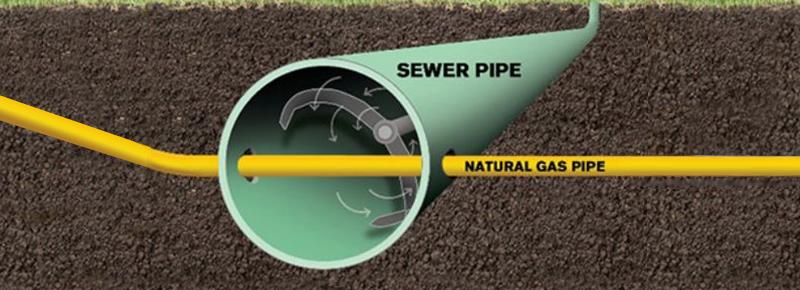Safely Unclog Sewer Lines
Blocked Sewer? It could be an intersecting gas pipe.
Know the hazards.
A sewer line may become blocked for a number of different reasons. These include natural causes such as encroaching tree roots or debris buildup, however it may also be caused by a gas pipe that was accidentally run through a sewer line (also referred to as a “cross bore”).
While you can have a gas line intersecting your sewer line for years without even knowing it, it can eventually cause your sewer to clog. Unfortunately, most mechanical equipment used to clear sewer blockages can break right through an intersecting gas pipe. This can lead to a dangerous situation where gas can leak through the sewer pipe and into your home and other buildings.
How can a gas line pierce a sewer line?
To minimize disruptions to sidewalks, patios and landscaping, utilities across the country use trenchless technology to install new gas pipes. Although this technology allows for easy and efficient installation of gas pipes, when a sewer line is not marked properly, it is possible for the gas pipe to pierce right through an underground pipe for sanitary sewers, storm sewers or other utilities. This can create a potentially hazardous situation when disturbed.
What do I do if my sewer is clogged?
Although a gas line bored through a sewer line is not an immediately hazardous condition unless disturbed, be aware that attempting to unclog a sewer that may have a gas line accidentally installed through it is dangerous and can result in a gas leak.
If you have a sewer clog, find out whether it is inside or outside your home.
- If the clog is inside, it isn’t caused by a cross bore and you can proceed.
- If the sewer clog is outside, use caution and assume it is due to a gas line bored through the sewer line. Do not attempt to unclog it yourself. To avoid a potential gas leak, call a plumber or PSE&G at 1-800-880-PSEG (7734).
- If you don’t know where the blockage is, you need to find out before proceeding.
Note: Even if you aren’t a natural gas customer, there is still a possibility that a gas pipe installed near the street was bored through your sewer line.
If you’ve already begun working on the sewer, look out for the following signs of a gas leak:
- A hissing noise.
- A natural gas or “rotten egg” smell.
- Bubbling water in a toilet, sink, or other standing water.

For a video with more information about cross bore safety, click here.





















